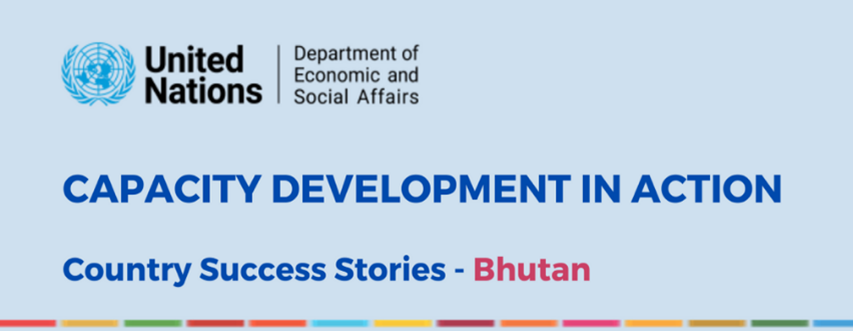Strengthening the capacity of civil servants in Bhutan to develop a public service training assessment framework
CHALLENGE
The Royal Civil Service Commission (RCSC) decided to implement a set of minimum mandatory training (MMT) for the professional and management category (PMC) and executives to strengthen civil servants' capacity to deliver on the SDGs. These trainings were designed to focus on the basic leadership and management skills required at each position level. Four levels of MMT training for PMC are targeted to develop five key capabilities and 26 key competencies through a blend of 15 programs. Accordingly, RCSC developed new curricula based on five capabilities and 26 competencies derived from the Leadership Capability Framework, Competency-Based Framework, and behavior indicators for each position level in the civil service. However, RCSC faced challenges in identifying assessors and developing assessment tools and methods as well as assessment guides to evaluate the learning outcomes for each participant.
SUPPORT PROVIDED
In 2022, UN DESA organized a peer-to-peer international workshop on public service training assessment frameworks for strengthening the capacities of public servants to implement the Sustainable Development Goals (SDGs). The international workshop was a follow-up activity to the UN DESA's Development Account Project 1819G on "Institutional arrangements for policy integration, coordination, and stakeholder engagement in SDG implementation and reviews in Asia and the Pacific." The event was conducted virtually through the Zoom platform and attended by government officials from Bhutan, as well as international experts and officials from participating countries. The workshop aimed to strengthen civil servants’ capacities in Bhutan, leading to the development of a public service training assessment framework for the Royal Government of Bhutan. In addition, the workshop provided a platform for practitioners and decision-makers of the RCSC of Bhutan and its affiliated institutes to learn lessons from international good practices. The invited panelists shared knowledge about various frameworks and approaches to enhancing training effectiveness through assessing learning outcomes while focusing on implementing the 2030 Agenda for Sustainable Development.
APPROACH ADOPTED
The workshop aimed at supporting the Royal Government of Bhutan to develop a national public service training assessment framework (PSTAF). A 7-step process was emphasized to facilitate the development of a PSTAF comprising: 1. Establishing the context; 2. Creating an infrastructure for assessment; 3. Defining the Mission of the Programme; 4. Developing the Programme Learning Outcomes; 5. Identifying assessment categories, methods, and tools; 6. Aligning instructional strategies to assessment strategies and 7. Monitoring, review, and utilization of assessments.
RESULTS
The workshop was attended by 102 participants from six countries and various UN entities, of which 68 government officials were from Bhutan. A post-event evaluation survey was carried out among participants from Bhutan. Forty (40) evaluation responses from participants from Bhutan were collected following the workshop. In total, 97.5 percent of attendees expressed satisfaction with the workshop. 65% of participants reported being extremely satisfied, while 32.5% reported being somewhat satisfied. 30% of attendees indicated they are somewhat likely to put what they learned in the workshop to use, while 70% said they are very likely to do so. Following the workshop, the Royal Civil Service Commission identified a course of action and potential next steps, which included:
• Actions relating to talent management programmes, such as preparing lower-level executives for current roles, functions, and duties through professional programmes, and preparing managers/leaders for higher-level or new roles through leadership programmes.
• Designing fit-for-purpose programmes addressing both individual and organizational competencies.
• Strengthening development centers focusing on learning outcome assessments, assessment framework, and integration of assessment reports in personnel management.
• Upscaling examination centers to assessment centers focusing on competent assessors, internal or external, and developing a leadership assessment framework.
LESSONS LEARNED
To make institutions effective, accountable, and inclusive, as elaborated in SDG 16, public administration systems must define new competency frameworks that can advance the principles of the 2030 Agenda and the principles of effective governance for sustainable development across the public service and ensure that they are put into practice. Strengthened institutional capacities to deliver relevant training programs are also needed to implement the SDGs. The latter should focus on encouraging new mindsets, competencies, behaviors, and new ways of working together across organizational boundaries. Training should be designed to be engaging, given the team structure in which the trainee works. It is essential to plan and strategize the training programs and link or integrate training interventions with other HR policies and systems like performance management and career progression. The translation of training into improvements in the functioning of the public sector requires going beyond knowledge acquisition. The government needs to identify the correct assessment principles and tools to assess the impact of different training programs. Competency-based training needs assessment is one of the most critical determinants of the success of training programs. Training assessments should be developed to assess the knowledge and skills acquired and whether the training and follow-up actions helped instill new values and mindsets, leading to expected institutional behaviors. The evaluation of the training's efficacy must follow the trainee back into the public service and assess the extent to which the targeted processes or procedures are changing.
 Bienvenidos a las Naciones Unidas
Bienvenidos a las Naciones Unidas
